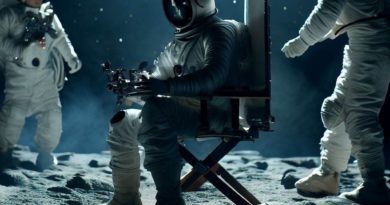Buzz Aldrin interview about moon landing is not proof that it was faked

Social media users are sharing a video of astronaut Buzz Aldrin being interviewed by American television host Conan O’Brien and claiming that Aldrin discussing parts of the moon landing broadcasts being animated is proof that it was all faked.
He was referring to animations used by broadcasters at the time in their coverage of the moon landing, intercut with real footage. The moon landing did take place and men did walk on the moon.
Examples of the erroneous social media posts can be seen ( here ) and ( here ).
A longer video of the interview, dated May 17, 2000, can be seen on YouTube ( here ).
At the 1:29 mark, O’Brien says: “Let’s talk about this because this is fascinating. I remember very clearly; I think anybody who was alive at the time does. I remember my parents waking me up and we went down, and we watched you guys land on the moon.”
Aldrin responds: “No, you didn’t. Because there wasn’t any television, there wasn’t anybody taking the picture. You watched animation so you associated what you saw with… you heard me talking about, you know, how many feet we’re going to the left and right and then I said contact light, engine stopped, a few other things and then Neil said ‘Houston, tranquility base. The Eagle has landed.’ How about that? Not a bad line.”
The moon landing took place on July 20, 1969 with astronauts Neil Armstrong and Buzz Aldrin. NASA said in 2006 that no one could find the original video recordings of the July 20, 1969, landing. However, in 2009 NASA released a complete digital make-over of the original landing footage that clarifies the blurry and grainy images of Neil Armstrong and Buzz Aldrin walking on the surface of the moon ( here ).
A video compiled by CNN shows the available footage from the mission ( here ), including takeoff and the astronauts climbing down and walking on the moon.
An article ( here ) by the Smithsonian National Air and Space Museum explains the challenges of recording footage of the moon landing and walking.
NASA contracted with Westinghouse for a black and white camera costing $2.29 million to capture the iconic moment, according to the museum. Photographs of the camera, which was stored in the lunar module’s Modular Equipment Stowage Assembly near the ladder Armstrong can be seen climbing down, can be seen ( here ).
“For us today, we can thank technicians for having recorded the broadcast, though the tapes assumed to be of the highest quality were never located despite searches for them in the last few decades,” the article reads. “What we see now on YouTube or in films are high definition scans of those best available copies.”
An article by Vox ( here ) says some television networks built sets to recreate some of the moments that were not able to be captured on video.
The National Science and Media Museum discussed the Apollo 11 broadcast on its website ( here ): “Many broadcasters used simulations to flesh out their Apollo programming. Networks paid hundreds of thousands of dollars for scale models of Apollo command modules and rockets. During the broadcast, these were used to create simulations of the mission which were then intercut with real footage.”
“The thing to remember is what news was like in the late 1960’s, not 24-hour continuous coverage,” Margaret Weitekamp, Chair of the Space History Department at the Smithsonian National Air and Space Museum, said by phone. “The coverage of that trip needed to be explained to the public without the ability for continuous relay of video we are now used to.”
“Animations would have been a part of a constellation of different ways that that story was told over a series of days. At the time, the coverage would have been combined with animations that helped provide a broader picture of what was being done. But this certainly doesn’t invalidate that those landings took place.”
There is no evidence that the moon landing was faked or that astronauts did not walk on the moon. However, there is plenty of evidence that it happened. Reports about the landing can be seen ( here ), ( here ) and ( here ).
Photographs of the moon landing can be seen ( here ), ( here ), and ( here ).
Reuters has previously debunked claims that the moon landing was faked ( here ), ( here ), ( here ).
VERDICT
False. Astronaut Buzz Aldrin explaining that broadcasters used animations during their coverage of the moon landing does not prove that it was faked.
This article was produced by the Reuters Fact Check team. Read more about our fact-checking work here .
Our Standards: The Thomson Reuters Trust Principles.
